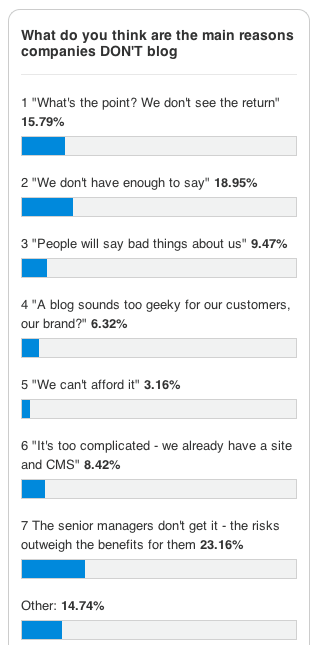What are the barriers stopping companies blogging and how can they be encouraged?
I strongly believe that every business should have a blog since they're an essential hub to your digital marketing activities. If you don't have one, you're missing out on one of the best ways to engage existing customers and to get new customers through the power of advocacy and SEO. So we're on a bit of a mission to get more companies blogging, but know we need to understand what is holding companies back.
I find when I ask in my training workshops, that often only a quarter to a third on the course have a blog. So there must be some serious reasons behind low business adoption of blogs. In the spirit of encouraging more companies to adopt them I've summarised here the reasons for and against. But first a poll - thank to those who helped devise the questions via our great Linked In Group discussion on reasons for not having a blog!
Thanks! for voting in our survey where we try to better understand the reasons that stop companies blogging.
The results show 3 main factors are the most important barriers:
1. The senior managers don't get it - the risks outweigh the benefits for them (23.2%)
2. We don't have enough to say (19.0%)
3. We don't see the return (15.8%)

Other was also a popular category where most talked about lack of time or the right specialists to write it - which clearly should have been a question!
- Not enough time to write it
- People are lazy. Don't want to put in the effort to keep a blog up.
- Competitors finding out too much
- Not clear who should own it
- Not enough time from contributors or to manage
- Not enough time or resources
- We don't have anyone with enough subject knowledge who has the time
- Time within the team - we're stretched to capacity already
- Don't want to start one without a strategy in place for creating content
- There no time to write a blog
- We don't have the time!
- My "we can't afford" = don't have the time resource available
Why blog may be the wrong name
As a starting point for the barriers, I think many companies are put off by the name - it can sound too geeky and maybe customers don't know what a blog is.
But it can be positioned differently; as a magazine for example. A great example of a blog, powered by the free tool WordPress, which doesn't appear as blog in the normal sense is the ASDA Online Magazine.

What do you think? I think a customer magazine works better for the company and the customers. I can imagine it would be a lot easier sell to the corporate communications team.
More reasons companies don't have a blog
Here are the reasons I hear most often, if you hear others, please let us know via the comments.
1. "What's the point, where's the return?"
The return on investment for a blog is certainly hard to prove in a monetary sense. But a big part of the business case is within SEO - where I think a blog is now essential to effective SEO, particularly now Google uses signals from social networks to rank pages.
This survey on blog SEO by The Top Rank Online Marketing Blog found that the vast majority of respondents found it was important to their SEO efforts. The chart shows how blogging helps.

Other key business benefits of a blog to build into the business case are:
Blogs are also dynamic to technology changes - plugins make them easy to extend
2 "We don't have enough to say?"
The counter argument is that you probably DO have enough to say for an enewsletter or through press releases? These can be repurposed for the blog. You HAVE to find enough to say to keep followers on social networks engaged and the blog provides a hub for this.
3. "People will say bad things about us"
True, but detractors will say the same about you elsewhere where it's less easy for you to manage and comment.
Of course you can moderate, with a commenting policy saying what's in and out. So only posts you authorise go up - I think that's often not understood.
4. "A blog sounds too techie/too geeky?"
This is a fair comment - I think blogs are maybe associated with tech site or personal blogs rather than companies.
In that case maybe position it as a customer magazine - as with the Asda example above. This will sit better with corporate communications teams in a larger organisation.
5. "We can't afford it"
This is an easy one to argue against. Many of the CMS described above are open source or require a small outlay for a theme. Yes, you will need a designer to update the skin, but total cost could be 100s rather than 1000s. The real cost is the staff time to edit it or to outsource this. That resource does have to be
6. "It's too complicated, we already have one-many sites and CMS"
This may well be true and I think many who do have a blog have difficulty integrating them - witness the Asda customer magazine again.
7. "The senior managers don't get it - the risks outweigh the benefits for them"
We've seen there are many objections, so it's easy to let all of these outweigh the benefits, particular when a blog is somewhat a leap of faith - the benefits in ROI can't be established in advance, but the same is true for an enewsletter, Facebook or Twitter presence and they seem to be authorised.
So that's the way it looks to me - what do you think are the barriers to more wide use of blogging and how can we encourage more companies to blog?









